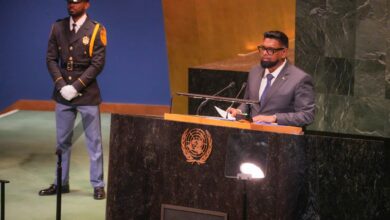(Caribbean Community (CARICOM) Secretariat, Turkeyen, Greater Georgetown, Guyana) – Ladies and Gentlemen, the imperative for the prohibition on nuclear weapons testing, use, and proliferation has never been more pressing at any time in this Century. Politically fraught, climate changing landscape that we are called on to navigate and the escalation of conflicts, directly or indirectly involving States in possession of nuclear weapons, have amplified concerns regarding the potential use of these weapons. This is an anathema to the Caribbean Community. We have retained and continue to do everything in our individual and collective power to maintain this regain as a Zone of Peace.
The Comprehensive-Nuclear-Test-Ban Treaty contributes to regional security by reinforcing the global norm against nuclear testing. It is also in the context of this treaty that CARICOM takes a strong stance against the transshipment of nuclear waste through the Caribbean Sea because of the possible negative effects of a nuclear accident on the delicate land and sea ecosystems of the Caribbean and the potential devastating effects this could have on the economies of Member States.
Also of keen interest to the Caribbean Community is the scientific and civil applications of the data managed by the Comprehensive Nuclear-Test-Ban Treaty Organisation (CTBTO, which we believe is an opportunity for collaboration. Given our vulnerability to a host of natural disasters, exacerbated by climate change, access to seismic data and joint efforts in tsunami warning systems and volcanic activity detection, could be invaluable for coastal and other vulnerable communities. The successful tsunami warning models established with Chile, Honduras, and Venezuela, provide a valuable framework for replication across our region, and are worth exploring.
This workshop is, therefore, timely and necessary, given the urgency of enhancing awareness among states on nuclear weapons and the applicable legal regime. I commend the CTBTO, the Agency for the Prohibition of nuclear weapons in Latin America and the Caribbean (OPANAL), and the Government of Jamaica for convening this important and forward-looking dialogue, and for extending an invitation to the CARICOM Secretariat.
The CARICOM Secretariat also warmly welcomes the CTBTO back to our region, in its efforts to build awareness around the provisions of the Comprehensive Nuclear-Test-Ban Treaty (CTBT) and the Organisations’ work. Sixteen years ago, the CTBTO’s workshops in Antigua and Barbuda and Jamaica played a pivotal role in promoting the ratification of the Treaty by several CARICOM countries. I am pleased to note that the CTBT has now been ratified by all CARICOM Member States and, in fact, by all states in Latin America and the Caribbean.
The Latin America and Caribbean region has a rich legacy in nuclear disarmament. This is a testament to our collective commitment and should make us all immensely proud. For us, however, the Weapons of Mass Destruction, are the proliferation of small arms causing widespread crime and violence through out the region.
OPANAL was, of course, established as early as 1969, following the adoption of the Treaty for the Prohibition of nuclear weapons in Latin America and the Caribbean (Treaty of Tlatelolco) in 1967. This trailblazing Treaty established the first nuclear-weapon-free zone in a densely populated region of the globe. It constitutes, to this day, a significant contribution by the countries of the region to the quest for global peace and general and complete disarmament.
I am also proud to say that three young independent CARICOM nations were among the signatories to the Treaty of Tlatelolco between 1967 and 1968. The region’s commitment to nuclear disarmament is also evident in the ratification of the Nuclear Non-Proliferation Treaty (NPT) by all Member States, as well as overwhelming support for UN Security Council Resolution 1540 in 2004 and the Treaty on the Prohibition of nuclear weapons adopted in July 2017.
It is evident that CARICOM’s dedication to nuclear disarmament has been unwavering, and we remain firm in our conviction that the continued existence of nuclear weapons contradicts the purposes and principles of the United Nations Charter.
I take this opportunity to commend the proactive and critical work of both OPANAL and the CTBTO, as they continue to raise awareness about the dangers of nuclear weapons and actively pursue measures to curb their proliferation and use. We anticipate your continued collaboration with CARICOM Member States to develop and maintain a robust verification regime, that allows for the full and effective implementation of the Treaty by all Member States, upon its entry into force.
In this context, I wish to highlight again the significance of the National Data Centres for All initiative (NDCs4All), including its critical capacity-building component. Small Island Developing States (SIDS), such as those in CARICOM, often suffer from human resource capacity constraints that impede our ability to effectively implement international obligations. This Initiative is therefore highly welcomed as it directly addresses knowledge and capacity gaps related to the CTBT. We anticipate that this will expand the network of National Data Centres throughout the CARICOM region.
As we take full advantage of this opportunity to deepen our understanding of the CTBT’s mandate, I encourage you to strategise around how your respective countries can leverage the CTBTO to safeguard the welfare and future of your nationals and the Caribbean Community as a whole.
I wish you all a very productive and beneficial workshop.





